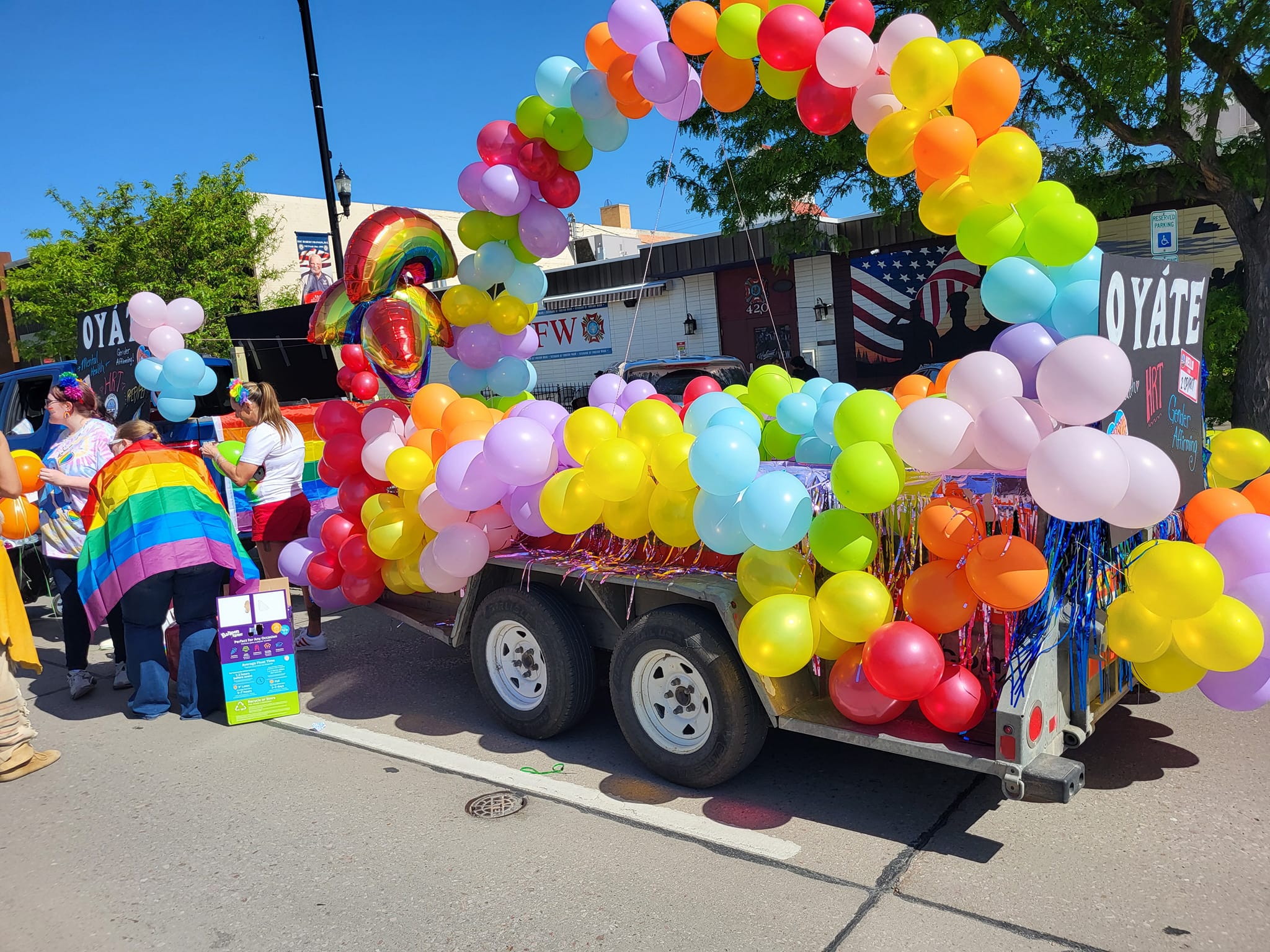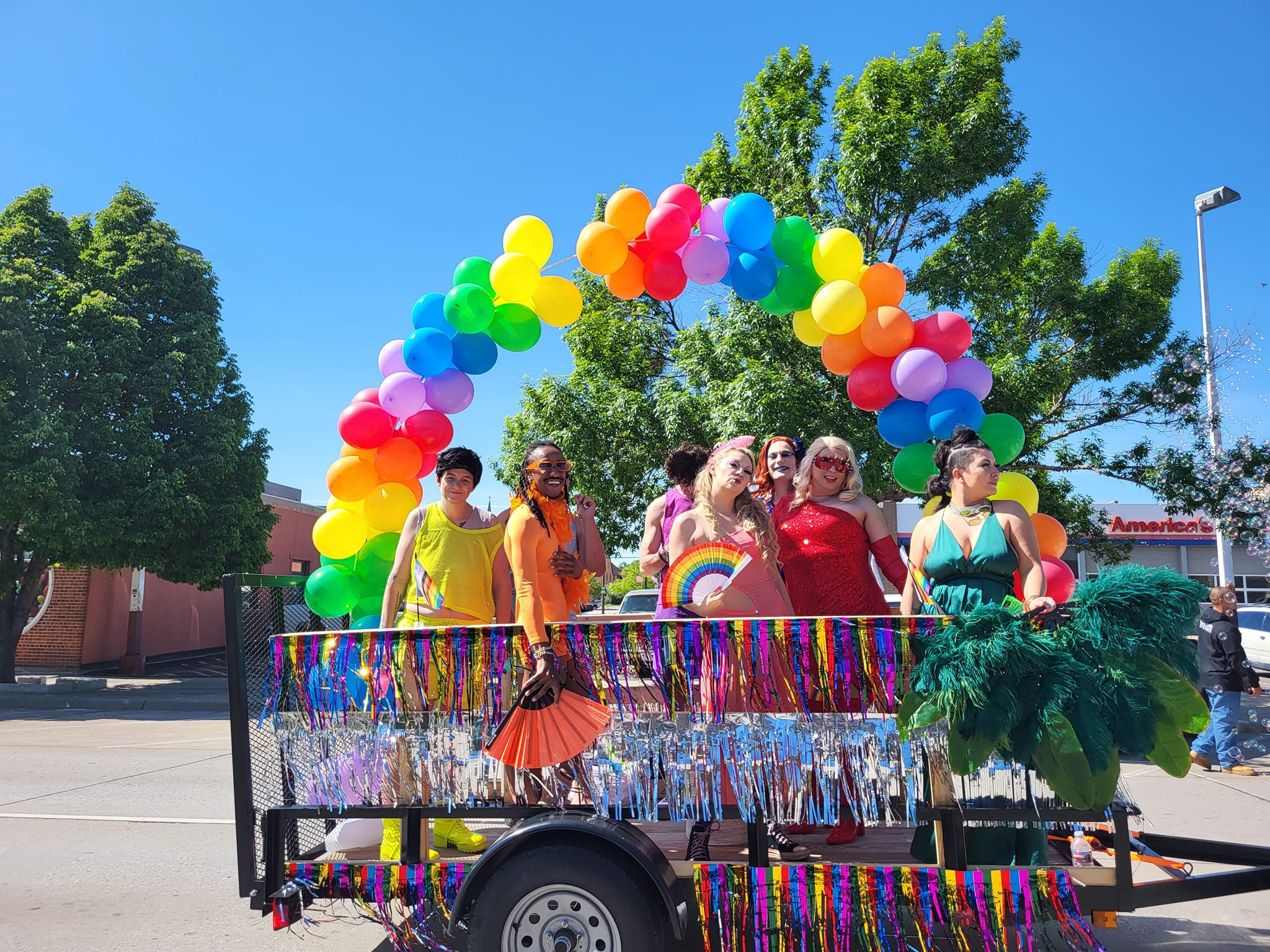First Annual Pride Parade was a watershed moment

A variety of floats participated, with top honors going to the Oyate Health Center float with the Songz Drag Family float coming in a close second. (Photo courtesy Black Hills Center for Equality, Inc.)
RAPID CITY – An estimated 1,500 plus people kicked off Pride Month on Saturday June 1, 2024, in downtown Rapid City. The throngs gathered to share what was a watershed moment – Rapid City’s first annual 2SLGBTQ + Black Hills Pride Parade. People lined the streets to see the colorful floats and support their relatives and friends who identify as Two-Spirit, Lesbian, Gay, Bisexual, Transgender and Queer.
Ben Sherman with Liberty and Justice for All spoke about his group which was a co-sponsor of the event with Black Hills Equality Center. “Our group includes everybody. We fight for your rights, Indigenous rights, women’s rights, and we work against police brutality. Our group is a tool to help collaborate in this community with other people to get stuff done. Like this parade.”
The very first Pride marches were held in June of 1970 in New York, Los Angeles and Chicago on the one-year anniversary of the Stonewall Uprising, although there had been decades of LGBT + activism and organizing for equal rights prior to 1970.

Songz Drag Family float wins second place at the Black Hills Pride Parade. (Photo courtesy Black Hills Center for Equality)
At the time of the Stonewall Uprising, homosexual acts were outlawed in every state, except Illinois, and businesses could be shut down for having gay employees and serving patrons who were gay. The Mafia operated most of the gay bars and clubs in New York at the time. Police raids were not uncommon but, on this day, the marginalized community members fought back. Although the gay rights movement didn’t begin at Stonewall, the events were a turning point for the gay liberation movement. Gay activism exploded across the country. In the fifty-five years since, there have been setbacks and enormous gains but there are still ongoing challenges.
Not only are physical threats still of concern but there are effort to make words like “gay” an insult again. Just this week Kyle Rittenhhouse, now 21, posted online simply the word “Gay” at David Hogg and Vice President Kamala Harris. He also said President Biden “is gay” and told Newsweek that “Newsweek is gay” when they asked for comment. In 2020, then 17-year-old Rittenhouse became a darling of the MAGA Movement when he shot and killed two men and injured another at a Black Lives Matter protest in Kenosha, Wisconsin. Rittenhouse said he used his AR-15 style firearm to defend himself. Rittenhouse was acquitted on all charges. He later said that he was a supporter of the BLM movement and was at the demonstration to protect businesses and provide medical assistance.
At the Rapid City event on Saturday, there was an effort by two men to intimidate and frighten people shortly after the start of the parade, a white male stepped into the parade path and began to scream obscenities at parade participants. Participants weren’t to be bullied and confronted him. The Dakota Grass Roots AIM Warriors were quick to respond by surrounding him and escorting him down the street. A Rapid City Police report said an officer attempted to de-escalate the situation, but the man refused to obey commands. He was arrested for disorderly conduct and obstruction of law enforcement. Police identified him as 23-year-old Tyler Wright of Rapid City. Upon further investigation, police say a video revealed that there was another man involved who had displayed a knife during the event. Police told Native Sun News Today that they have identified that man but haven’t released his name as the investigation is ongoing.
An elderly gentleman who didn’t want to give his name said he was getting a coffee at the downtown Starbucks. He said he heard one of the agitators say, “Babies shouldn’t see this type of stuff” and said the agitator then shoved his hand into a little baby’s face, “That’s what started it all.”
Christopher Pina, representing the Two-Spirit group, was one of the dignitaries leading the parade. He spoke about the fear. “I was born and raised here. I came out at the age of 13 as bisexual and later I came out as gay because I was told its dangerous here because of cases like Mathew Shepard.”
While there was the thought that they might have to contend with some ugliness, Pina said he didn’t see any hecklers. He said that Toni Diamond from the Black Hills Equality Center gave an empowering speech before the parade. “She said ‘Let’s not look at the naysayers. Let’s just wave our pride flags and continue to be proud, and let’s not get involved in anything other than us marching down this street.’ And then we did. And it was a really proud moment.”
Prejudices linger around in the form of outdated beliefs. Pina said Rapid City remains entrenched in old divisions of Cowboys and Indians. “It’s still black and white. We’re still living in the 1700s. It doesn’t seem like much has changed. They still marginalize us. If you have light skin, then you are white. If you have brown skin then you are either Native, Mexican or Black and then it’s separated as such. You have to be more city Native than rez Native or more rez Native than city Native. So, I would like to see all of us come together, join hands, to sit at one table and not worry about the color of our skin and just worry about what can be done for the future of our children.”
Continued false information poses a threat to LGBTQ + individuals also. “Combating misinformation and changing hearts and minds will take open communication on all sides,” said Pena.
One onlooker shared the general attitude of those who came to celebrate, shaking her head and shrugging her shoulders she said, “Haters gonna hate.” But the energy created by efforts to disrupt the event quickly dissipated. The sidewalks were packed with spectators, a heartening sign of community support.
Local businesses also largely welcomed the event. Sherman said when he had originally approached the downtown business community letting them know about the parade route, he found just a few negative comments. “The majority were mutually enthusiastic. So, unless we talk about it, we don’t realize the amount of acceptance that already exists.” Still, Sherman said some owners were excited but also too afraid to hang something up in their store. “But people do want to get involved so I hope this helps to push the needle.”
Sherman said most people at the parade just wanted to enjoy the festivities. “Everyone was just so happy to be there. Even throughout the rest of the day, I saw people out in different parts of Rapid, wearing their bright colors and just feeling like they belong and that they have a stake in this community.”
Overall, Rapid City’s first annual 2SLGBTQ + Black Hills Pride Parade marked an important step in the right direction. It gave a visible platform to those who are historically marginalized. The outpouring of local support offers hope that attitudes can continue to progress, with ongoing advocacy and relationship-building.
“What we did today was historic,” said Pina. “We wanted to show everyone that we’re all dancing under the same rainbow. It was momentous to see us all come together, and see all the queens out there, then all of our supporters and then all of our families.”
A variety of floats participated, with top honors going to the Oyate Health Center float with the Songz Drag Family float coming in a close second.
Organizers are already planning for the second annual parade next year.
(Contact Marnie Cook at cookm8715@gmail.com)
The post First Annual Pride Parade was a watershed moment first appeared on Native Sun News Today.
